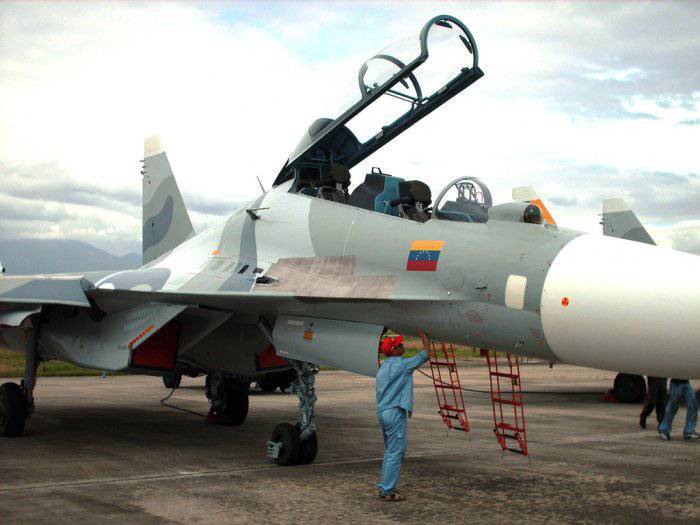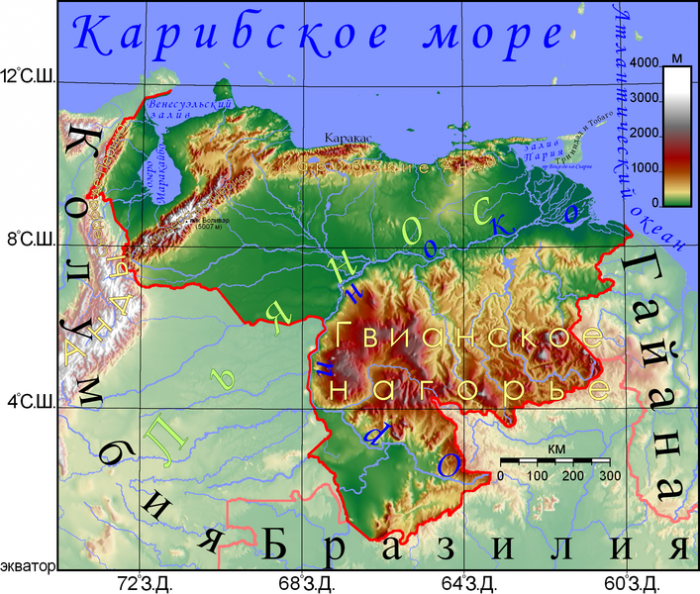USA vs Venezuela
Venezuela has every chance of becoming the next victim of a global “crusade” of the United States for maintaining control over the main regions associated with the extraction of hydrocarbons. The “Balboa Plan”, which envisages the “normalization” of the situation in Venezuela, was not canceled by anyone in Washington and Brussels. Caracas and Hugo Chavez personally represent a perfect goal for the West. Yes, Chavez understands this perfectly, with this reason is connected with the active rearmament, strengthening of the armed forces of Venezuela with mass deliveries of Russian weapons, military-technical cooperation with Russia, China, Iran.
The blow can be timed to the 2012 elections of the year, if Hugo Chavez wins, he will remain in power until the 2019 of the year, so you should expect political provocations, for example, the assassination of an opposition leader or a few further on the "Libyan scenario."
The main reasons for hitting Venezuela, signs of preparation
- If information about global climate shifts is at least partially correct, then the United States and Western Europe are waiting for severe winters, a sharp increase in the cold period, a sharp increase in energy consumption. Therefore, Washington and its European allies need a more docile regime in Caracas. Venezuela’s hydrocarbons, even with intensive exploitation, will last for 100-150 years. Approximately half of the oil from Venezuela goes to the USA — this is 13% of US oil imports at the end of 2006.
“Hugo Chavez has set up Western transnational corporations against himself: in the 2007-2008 years, the oil industry, the iron and steel industry, the cement industry, and mobile communications were nationalized in the state. In the area of military procurement, Venezuela reoriented itself to the Russian Federation and China. The role of foreign capital is limited, however, Caracas is seeking support in the Russian Federation - in 2009, an agreement was reached to allow Russian companies to develop gas fields and build gas pipelines in the country.
- Venezuela is headed by an “anti-American dictator” who violates the “democratic freedoms” of the population; muddies the water in South America, fighting “American imperialism”; a friend of the “dictators” of the brothers Castro, Ahmadinejad, Gaddafi, Assad; He regularly criticizes US policy, a true speaker, popular among anti-Americanists.
- Venezuela is actively arming, that is, the later the strike will be, the higher the losses can be.
- The forecasts of Western analysts that the energy policy of William Chávez, with its “social orientation”, “preferential supplies” to Latin American allies will fail, have not come true. Chavez only strengthens his position.
- Caracas did not succumb to the pressure of Washington, in order to stop cooperation with Iran.
- The US information war against Venezuela has been going on for a long time - even under Bush there were rumors about Chavez supporting Arab terrorists, about creating secret training grounds for training saboteurs (Margarita Island was mentioned); Then there were suggestions about Iran’s development of uranium mines in the state of Bolivar, Iran’s “secret laboratories” to develop nuclear weapons in Venezuela. More recently, it was reported that the Iranians are building a missile base for Venezuela on the Paraguana Peninsula, even earlier they announced that Russia is building such a base. Chavez then showed reporters that they are building wind turbines.
“The US intelligence agencies and private organizations are already preparing for the 2012 elections of the year: the Venezuelan opposition is being joined through social networks. They work in the midst of radical youth movements, Colombian militants. Oppositional Venezuelan media are conducting subversive activities. The main charges of the regime are high corruption, high crime in the country, “freedom” of actions for drug mafias, “squandering” of oil in order to support disabled allies (especially Cuba), the collapse of the country's infrastructure - regular power outages, poor roads, interruptions in water supply, problems with food, etc. In the field of foreign policy, they criticize the futility of cooperation with the Russian Federation and China, especially the military.
Reference: "Operation Balboa", in 2005, in Spain, there was a "leak" of documents of the operational headquarters exercises of the NATO countries, codenamed Operation Balboa. According to the exercise scenario, a situation threatening stability in the region, life, freedom of citizens of western countries and oil fields was created in one of the states of South America (Venezuela was meant). To eliminate the threat, urgent “side” armed intervention was required. The “Operation Balboa” plan describes in detail the sequence of actions by NATO and the US armed forces to neutralize “extremists” and ensure uninterrupted supply of hydrocarbons to “traditional consumers”. The Balboa Plan was rehearsed in the Ecuador border zone in March 2008, while a detachment of Colombian commandos, led by American military advisers, attacked the FARC (Revolutionary Armed Forces of Colombia) mobile partisan camp. Pre-missile strikes on the camp of the American Air Force played a major role in the success of the operation: one of the FARC leaders, Raul Reyes, was killed, his closest comrades and bodyguards were killed.
Venezuela is arming
According to the Center for the Analysis of World Trade in Arms (CAMTO), in recent years, Venezuela has acquired arms worth $ 5 billion from the Russian Federation. Purchased: 24 Su-30MK2V fighters, Mi-17V5 helicopters (38 units), Mi-26T2 (3 units) and Mi-35M2 (10 units), small arms - 100 thousand Kalashnikov rifles, 5 thousand Dragunov rifles. In 2009, the Russian Federation gave Caracas a loan of $ 2,2 billion for the purchase of our weapons - 92 major tank T-72 and multiple launch rocket systems "Smerch". In addition, other types of weapons were purchased: BMP-3 infantry fighting vehicles and BTR-80A armored personnel carriers (240 units in total), 1B152 unified command and observation posts, Nona-SVK self-propelled mortar and artillery systems, and Sani self-propelled mortars , anti-aircraft artillery mounts ZU-23-2 and Ural-43206 and Ural-4320 trucks. In Venezuela, they build factories for the production of AK assault rifles, cartridges for them and an aircraft repair plant for the maintenance and repair of Russian helicopters.
In 2010, the loan was increased to 4 billion dollars. According to V. Putin, the volume of deliveries to Venezuela could exceed 5 billion dollars, according to the Spanish newspaper La Vanguardia, announced in the 15 issue of April 2011 of the year, this amount is 11 billion dollars. Hugo Chavez said that Venezuela needs 600 main tanks, so new purchases of main tanks are possible, and Venezuela also needs air defense systems. He announced the creation of an integrated, air defense system in the country in September 2009. It should include Russian air defense systems of small, medium, long range, including C-300В. Tor-M1 and 1800 man-portable Igla-S anti-aircraft missile systems have already been delivered to Venezuela. Helicopter simulators were built for Venezuela - 6 simulators manufactured by Tranzas (St. Petersburg).
Venezuela became for Russia simply a breakthrough in South America, negotiations are underway, and there is interest in buying: the Su-35 batches, Mi-28H helicopters, mobile coastal missile systems, the Be-200 amphibian firefighter, IL-114 naval patrol aircraft , the patrol boats of the 14310 “Mirage” project, the amphibious assault craft of the 12061 “Murena-E” project, the Russian diesel-electric naval submarines, the Ansat training helicopters.
Since 2010, the Omsk Tank Engineering Institute has been studying 45 Venezuelan soldiers. Hugo Chavez pursues a wise policy - if you want peace, prepare for war, eternal truth ...
Sources of:
http://www.fondsk.ru/
http://www.armstrade.org/
http://www.dni.ru/polit/2011/6/1/213260.html
http://ru.wikipedia.org/wiki/Экономика_Венесуэлы
http://www.rosbalt.ru/business/2011/06/02/854778.html
http://www.lenta.ru/news/2011/05/24/infanteria/
http://www.politjournal.ru/index.php?action=News&tek=9831
http://nvo.ng.ru/armament/2011-06-03/8_chaves.html


Information